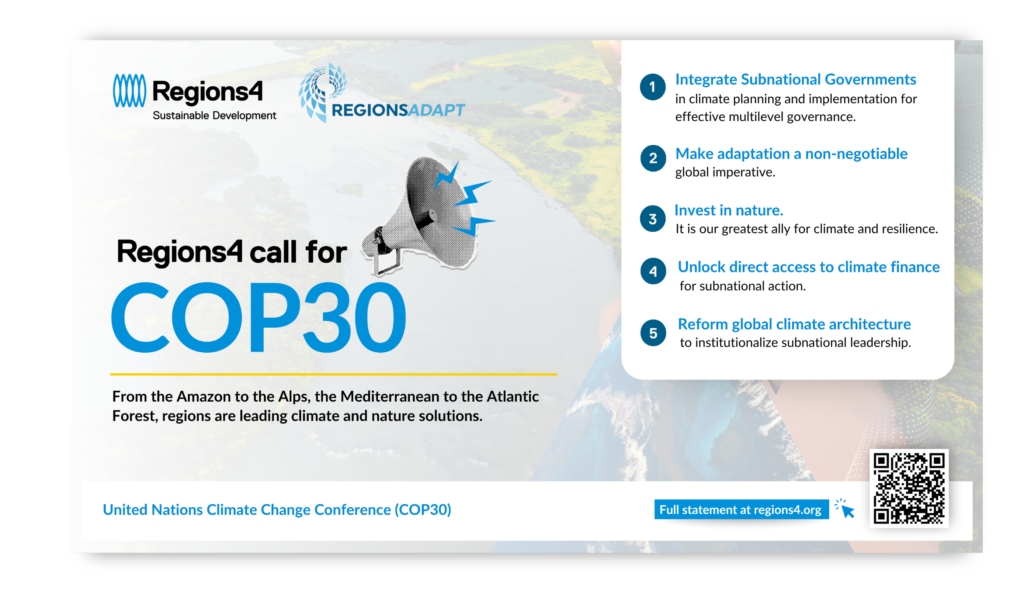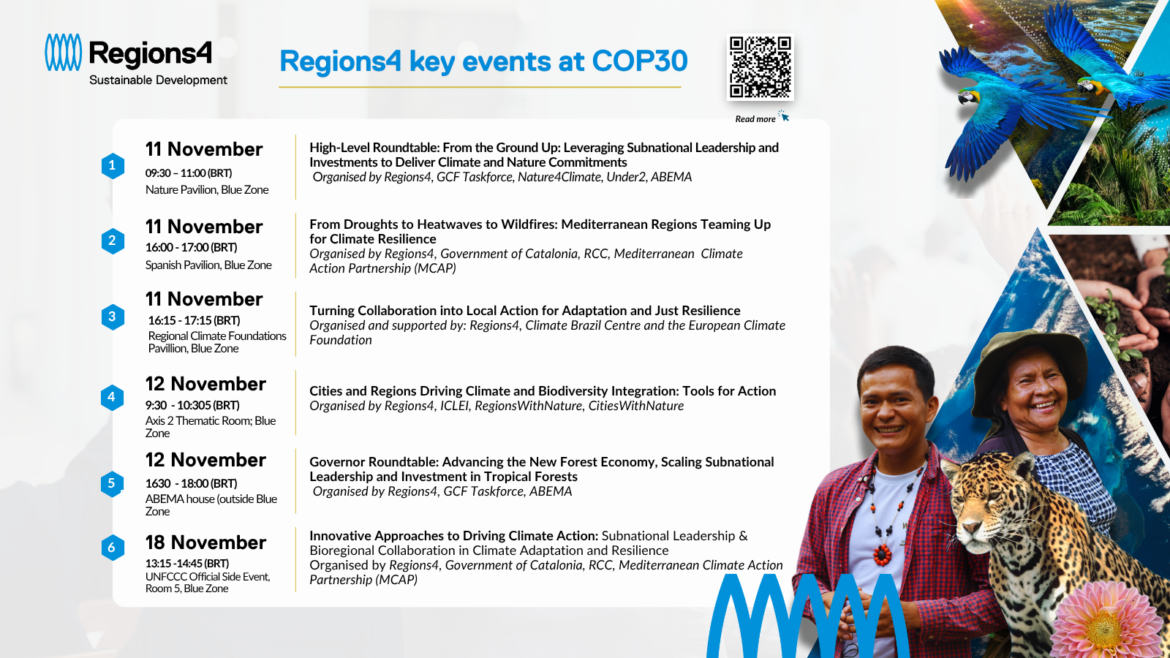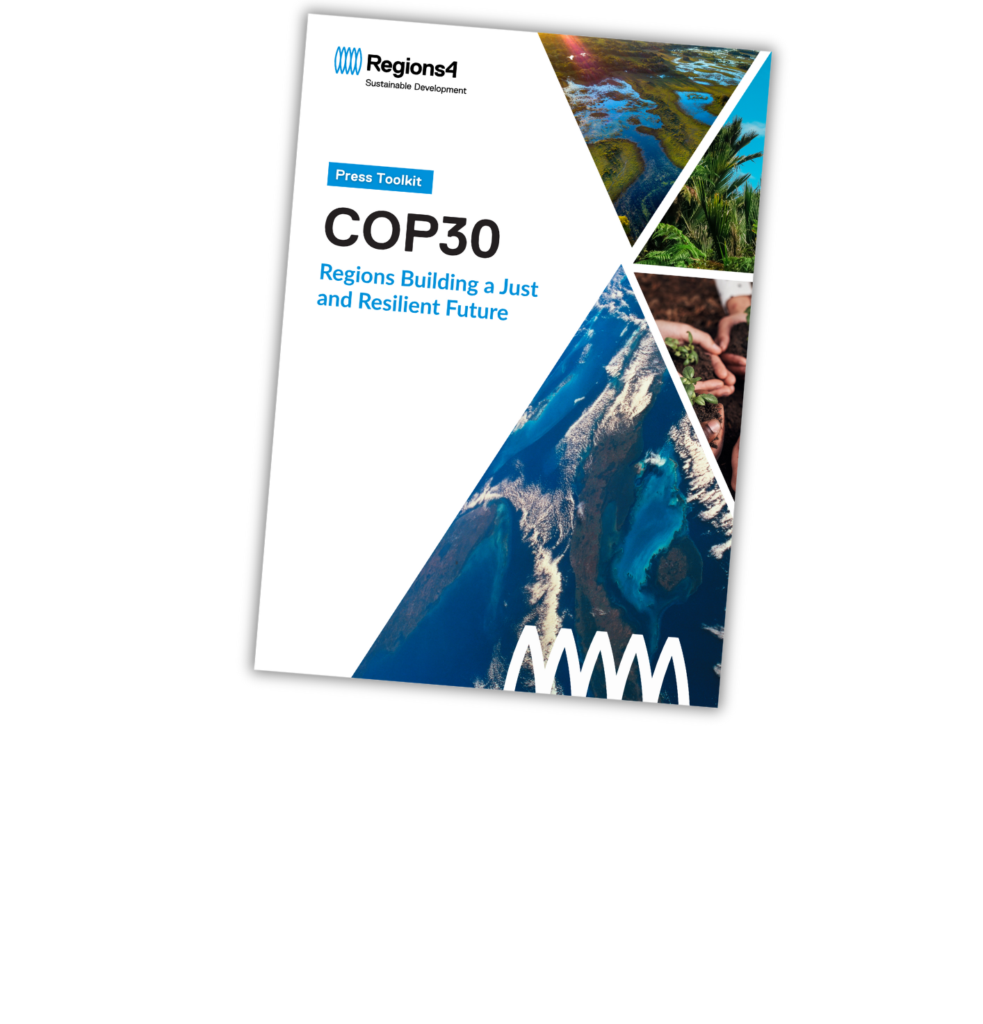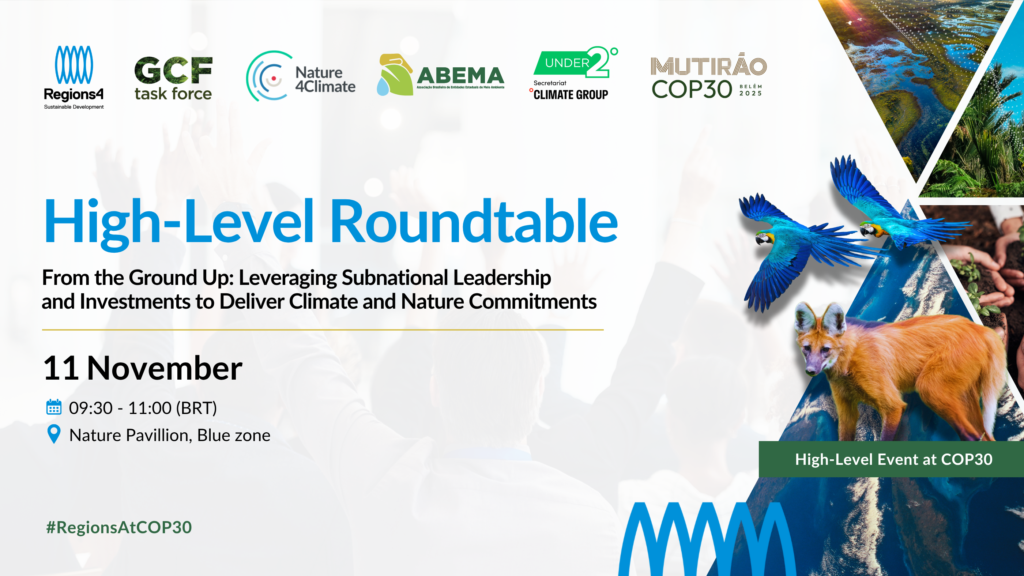
HIGH-LEVEL ROUNDTABLE | From the Ground Up: Leveraging Subnational leadership and Investments to Deliver Climate and Nature Commitments
Date: 11 November
Time: 09:30 – 11:00 h (local time)
Location: Nature Pavilion, Blue Zone
Organisers: Regions4, GCF Taskforce, Nature4Climate, Under2, ABEMA
The high-level roundtable will spotlight subnational governments – states, provinces, and regions – as essential implementers of national climate and biodiversity goals. By translating national commitments into territorial action, subnational actors drive just resilience, biodiversity protection, and sustainable investments. The session will showcase how regions are advancing NDCs, NAPs, and NBSAPs through integrated, nature-positive approaches, setting the stage for COP31 ambition.
Open to negotiations, donors, national and subnational leaders and observers.
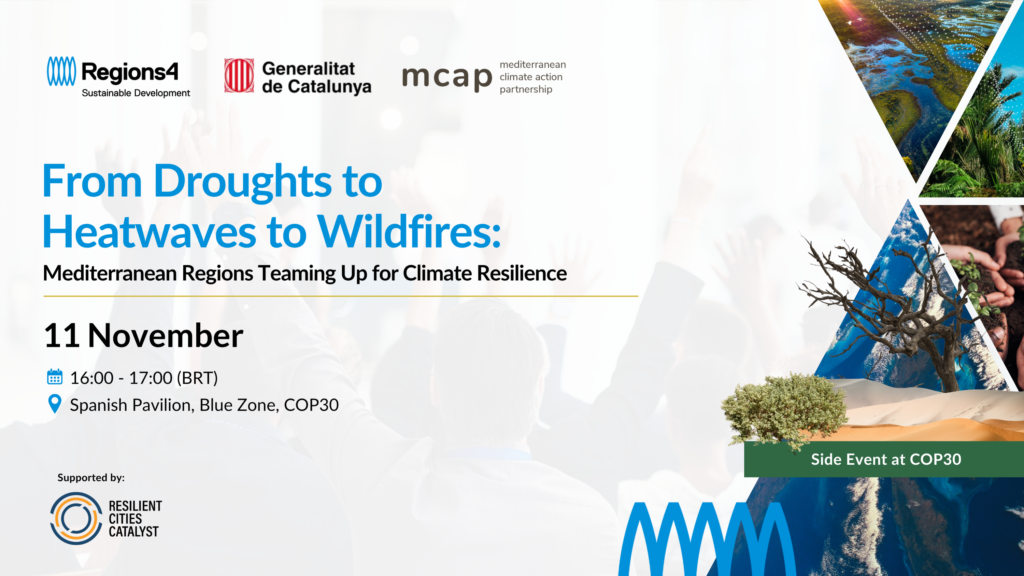
SIDE EVENT | From Droughts to Heatwaves to Wildfires: Mediterranean Regions Teaming Up for Climate Resilience
Date: 11 November
Time: 16 -17 h (local time)
Location: Spanish Pavilion, Blue Zone
Organisers: Government of Catalonia, Regions4; RCC, Mediterranean Climate Action Partnership (MCAP)
Subnational governments play a pivotal role in climate action, bridging national strategies and local implementation. As legislators, planners, and conveners, they often set more ambitious targets than federal governments, despite facing resource and coordination challenges. Increasingly, bioregional collaboration offers a powerful model for knowledge exchange and joint adaptation among regions sharing similar environmental realities. This session will explore how regional cooperation and interregional solidarity can strengthen resilience, highlight innovative mechanisms to scale adaptation finance, and amplify regional voices within the global climate agenda.
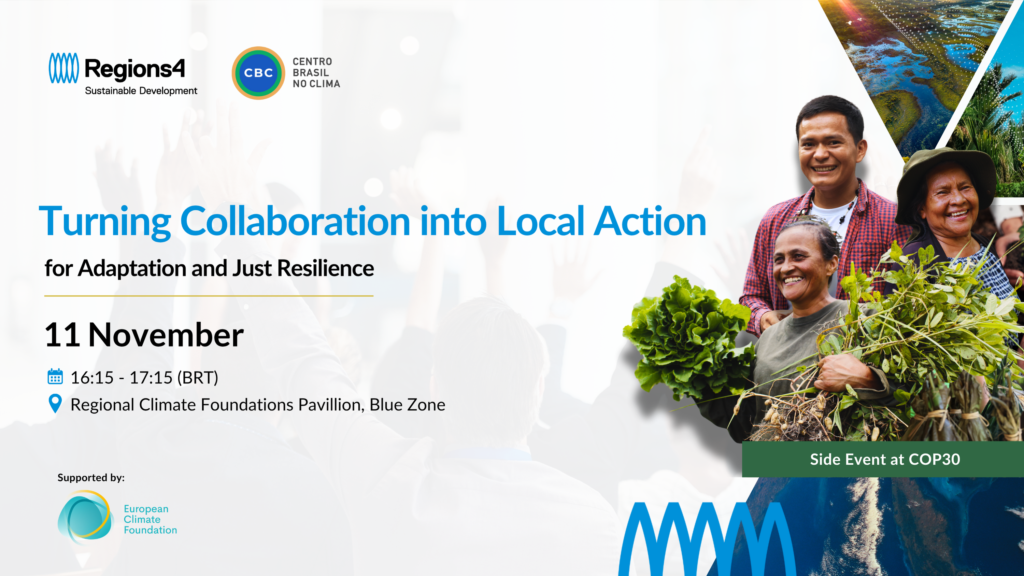
SIDE EVENT | Turning Collaboration into Local Action for Adaptation and Just Resilience
Date: 11 November
Time: 16:15 –17:15 h (local time)
Location: Regional Climate Foundations Pavilion, Blue Zone
Organisers and partners: Regions4, Climate Brazil Centre and the European Climate Foundation
This session will examine how state governments can strengthen climate adaptation through effective implementation frameworks, drawing on national and international experiences. By exploring legal and institutional mechanisms—such as State Adaptation Plans, budget laws, the ClimaBrasil Panel, and monitoring systems—it will identify pathways to ensure coherence, continuity, and transparency in adaptation policies.
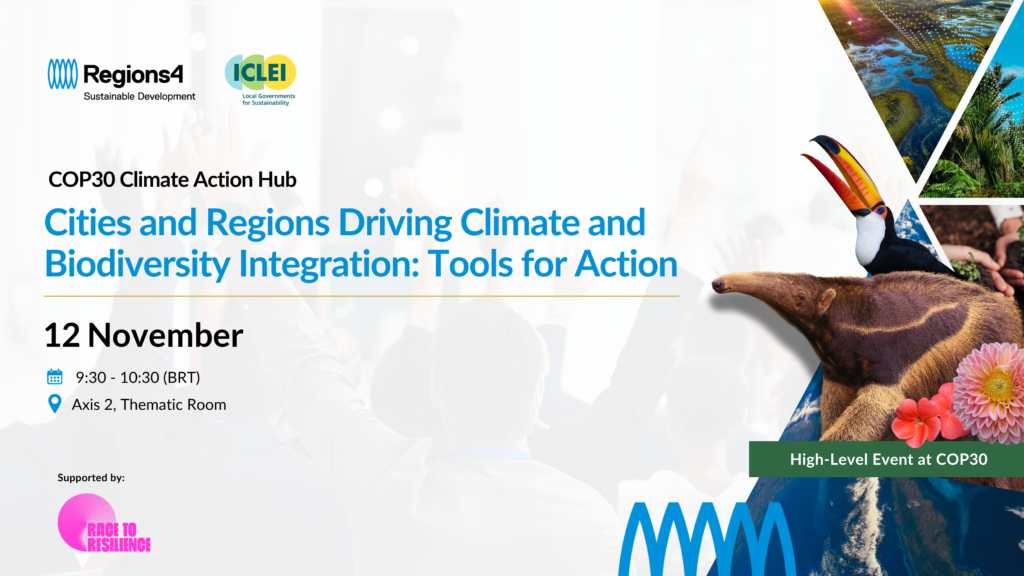
SIDE EVENT | Thematic Hub Session: Cities and Regions Driving Climate and Biodiversity Integration: Tools for Action
Date: 12 November
Time: 9:30-10:30 (local time)
Location: COP30 Climate Action Hub, Blue Zone
Organisers: ICLEI, Regions4, RegionsWithNature, CitiesWithNature
This session will explore how local and subnational governments are integrating climate and biodiversity agendas through practical tools, data-driven approaches, and real examples. It will highlight collaborative initiatives helping cities and regions turn global goals into territorial, measurable impact.
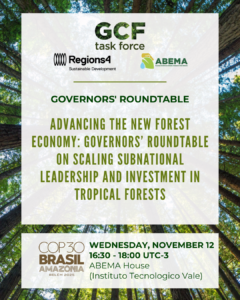
GOVERNOR ROUNDTABLE | Advancing the New Forest Economy: Governors’ Roundtable on Scaling Subnational Leadership and Investment in Tropical Forests
Date: 12 November
Time: 16:30-18 h (local time)
Location: ABEMA House (Instituto Technologico Vale, outside of Blue Zone)
Organisers: Regions4, GCF Taskforce, ABEMA
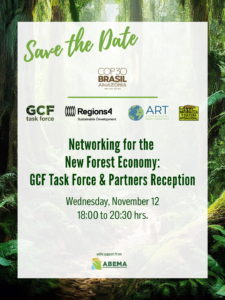
NETWORKING RECEPTION | Networking for the New Forest Economy: GCFTF & Partners Reception
Date: 12 November
Time: 18:00 – 20:30 h (local time)
Organisers: GCFTF, Regions4, ART/Trees, Nature & Culture International
This networking event will spotlight how territories and regional governments are bridging local solutions for climate and nature with global ambitions, fostering meaningful interregional exchange and collaboration.
By invitation only.
DONOR ROUNDTABLE: Investing Where Change Happens: The Just Resilience Action Platform Linking Territories and Finance for Just Resilience
Date: 13 November
Time: 12:00 – 13:00 (local time)
Location: Nature Pavilion, Blue Zone
Organisers: Regions4 and Nature4Climate
Closed-door on invitation-only.
PRESS CONFERENCE| Positioning Health at the Centre of Adaptation Finance
Date: 13 November
Time: 14:30 – 15:00 (local time)
Location: Press Conference 2, Area D, Blue Zone
Organisers: Climate Trends, Global Climate and Health Alliance, Global Strategic Communications Council
This press conference will position health as an essential entry point for adaptation finance discussions. By elevating developed country leadership and frontline experiences, we aim to contribute to narratives on more equitable adaptation finance commitments- especially for developed country actors.
NETWORKING RECEPTION | Highlighting 5 years of impacts with the Race To Resilience
Date: 13 November
Time: 18:00 – 19:00 h (local time)
Location: Resilience Hub, Blue Zone
Organisers: Race to Resilience
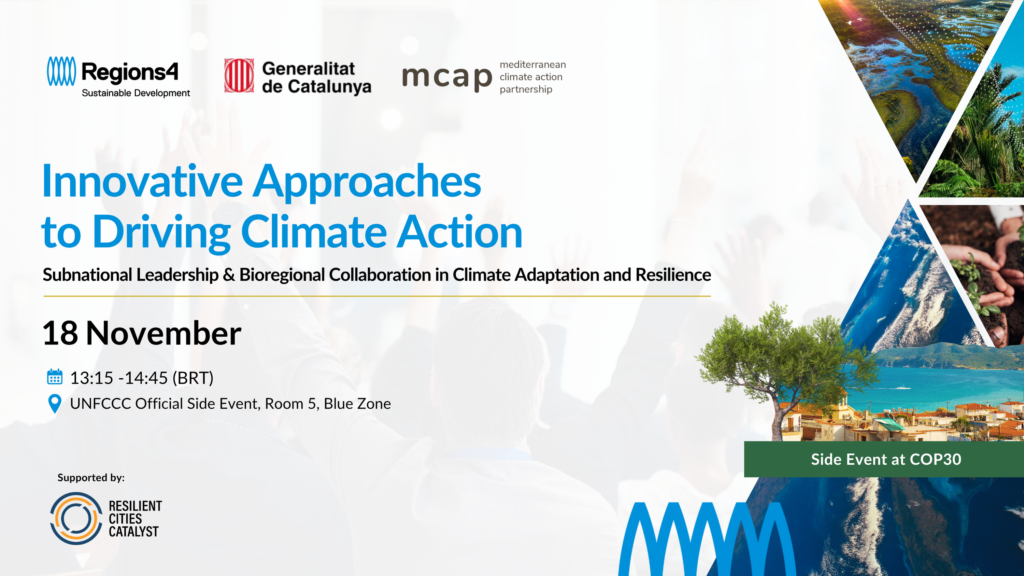
UNFCCC OFFICIAL SIDE EVENT | Innovative Approaches to Driving Climate Action: Subnational Leadership & Bioregional Collaboration in Climate Adaptation and Resilience
Date: 18 November
Time: 13:15 – 14:45 h (local time)
Location: UNFCCC Official Side Event, Room 5, Blue Zone
Organisers: Regions4, Government of Catalonia, RCC, Mediterranean Climate Action Partnership (MCAP).
Join a high-level discussion on how Mediterranean and other bioregions are collaborating to strengthen climate resilience through shared learning, innovation, and partnerships. Subnational governments play a vital role by bridging national goals with local action, setting ambitious targets, and driving implementation despite resource constraints. This event will spotlight successful bioregional strategies and emphasise the critical role of subnational leadership in advancing climate adaptation and resilience. Attendees will gain insights into proven initiatives, scalable solutions, and innovative financing approaches to boost climate action at local and regional levels.
Key events from members and partners at COP30
SIDE EVENT | Climate Federalism from Brazil to Canada: Canadian Leadership for Multilevel Climate Governance
Event details: 10 November | Time: 13:45 – 14:30| Canada Pavilion
Organisers: Organised by McGill Institute for the Study of Canada (MISC)
The COP30 presidency has emphasized the concept of “climate federalism.” Like Brazil, Canada is among the endorsers of the CHAMP initiative (Coalition for High Ambition Multilevel Partnerships) and a member of the “Friends of Multilevel Action.” This panel seeks to stimulate discussion on Canada’s leadership in multilevel climate governance: both the role it has played to date and the role it can and should continue to play through domestic policy or politics, multilateral action, and international negotiations. The challenges ahead cannot be met without the active involvement of regional governments, municipal authorities, and Indigenous communities worldwide. The panel will therefore bring together representatives of the federal and federated governments, Indigenous communities, and municipal authorities to discuss together current dynamics of Canadian climate federalism and to envision future directions.
PRESS CONFERENCE | Partners in Implementation: Cities and Regions are leading the Mutirão
Event details: 10 November | 14:30-15:00 | Press Conference 2, Area D
Organisers: LGMA
This press conference will highlight how cities and regions are driving climate delivery through multilevel collaboration, building on the momentum of CHAMP, the Local Governments and Municipal Authorities (LGMA) Constituency Joint COP30 Position and the outcomes of the COP30 Local Leaders Forum. It will underscore how aligning local, regional, and national action can move the world from ambition to implementation through resilient infrastructure, inclusive services, and urban climate finance.
SIDE EVENT | Accelerating States System – Amplify the world and health systems
Event details: 10 November | 15:30 – 16:30 | World Health Organization Pavilion, Blue Zone
Organisers: Race to Resilience, Regions4
This session will spotlight how coordinated, multisectoral adaptation efforts can protect communities, strengthen health systems, and improve well-being in a changing climate. Anchored in the Race to Resilience, the global campaign led by the Climate Change High Level Champions that mobilises non-party stakeholders, including the private sector, civil society, and subnational governments, to build the resilience of 4 billion people by 2030, the discussion will feature partners advancing innovative, inclusive, and scalable solutions for resilient health systems and people’s well-being.
SIDE EVENT: Delivering Impact: People Centred Adaptation Action
Event details: 11 November | 12:30-13:30 h (local time)| COP30 Action Agenda Zone
Organisers: Race to Resilience
At COP30, the Race to Resilience presents its first cumulative results on implementation: nearly half a billion people are now more resilient, 18.4 million hectares of nature are protected, and USD $4.18 billion in adaptation finance has been deployed, proving that inclusive, people-centred climate action advances the Global Climate Action Agenda and delivers measurable impact.
SIDE EVENT | Race to Resilience from Pledges to Implementation – Launch of the 2025 Progress Report
Event details: 13 November | 17:00 – 18:00 h (local time) | Resilience Hub, Blue Zone
Organisers: Race to Resilience
Join the Race to Resilience, partners, and Global Ambassadors to celebrate nearly five years of impact and the milestones of the campaign. For the first time, the Race to Resilience progress report presents cumulative results on implementation, showing resilience in practice beyond pledges and plans. The report highlights farmers accessing climate loans, communities receiving early warnings, homes strengthened against storms, and reefs restored to protect coastlines. Five years into the Decade of Delivery, these achievements come as climate impacts intensify, threatening livelihoods, ecosystems, and development. Aligned with the COP30 Action Agenda and the Global Goal on Adaptation, the Race to Resilience campaign mobilises non-State actors to deliver tangible outcomes. Halfway to 2030, nearly 500 million people are now living with greater resilience.
SIDE EVENT: Subnational Governments Facing Headwinds in the Americas and Pursuing Climate Transition
Event details: 15 November | 10:45 – 11:30 h (local time)| Canada Pavilion
Organisers: Under2 and the Government of Quebec
Event objectives:
- Address the political and economic challenges faced by subnational governments in the Americas and present solutions and strategies developed to address them.
- Demonstrate the progress achieved in the Americas in implementing a just and equitable energy transition in many strategic areas of the economy.
- Illustrate the benefits of this transition for communities and economic actors.
- Underline the strategic role of international collaboration in times of political turmoil.
SIDE EVENT | Francophone Interregional Cooperation COOP’R: Territorial Experiences Combining Biodiversity, Climate, and Local Economic Development
Event details: 19 November | 14:15 – 15:15 (local time) 18:15 – 19:15 (CET time)| Francophone IFDD Pavilion and Online
Organisers: COOPR, AIRF, Regions4
This event aims to present the COOP’R interregional cooperation program (2023–2025), led by the International Association of Francophone Regions (AIRF), which engages 16 local governments in Africa and Europe in a joint effort around protected areas, participatory governance, and sustainable tourism. Through technical clusters (Guinea, Cameroon, France) and a series of thematic webinars, Francophone regions have acquired new skills and initiated concrete projects that combine economic development with ecosystem preservation.
Link to online participation here.
More information available here.

